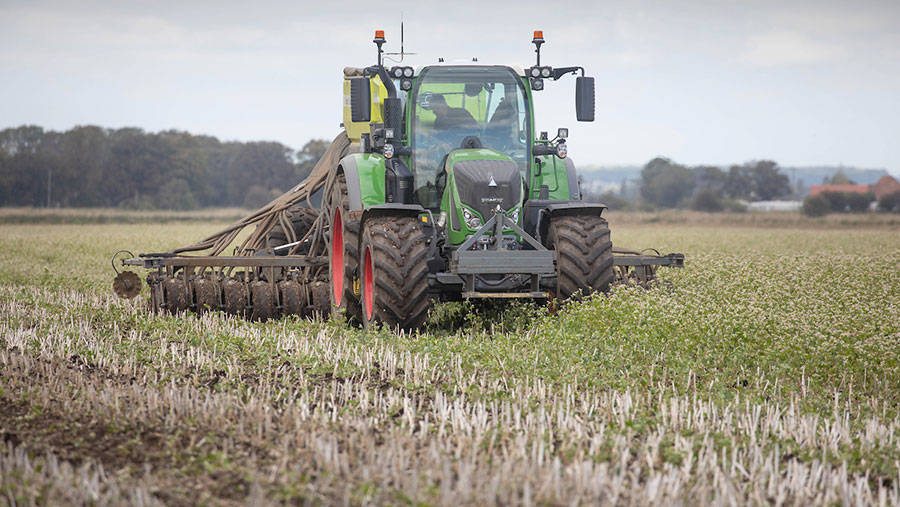SFI soil payment rates revealed but disappointment abounds
 © Tim Scrivener
© Tim Scrivener Industry leaders are disappointed with the payments on offer for managing soils under Defra’s Sustainable Farming Incentive (SFI) for 2022 – but stress this must not discourage farmers from applying.
Defra secretary George Eustice is set to announce the payment rates for three SFI 2022 soil standards for England at the CLA Rural Business Conference in London on Thursday 2 December.
Mr Eustice will wait until the Oxford Farming Conference in January to announce any updates on the two other components of Environmental Land Management (ELM), the Local Nature Recovery and Landscape Recovery schemes.
See also: How the new Arable Soils Standard could help fill the BPS gap
The minister is expected to confirm the following payments for the three different soils standards:
- Arable and horticulture soils: £22/ha for introductory actions, £40 for intermediate actions
- Improved grassland soils: £28/ha for introductory actions, £58 for intermediate actions
(No advance payments will be offered for either standard, but could be introduced from 2023 onwards) - Moorland and rough grazing: the introductory level will pay £148 fixed, per agreement each year, plus an additional payment rate of £3-£6/ha for every soil sampling.
(Both intermediate and advanced payment levels will follow in the SFI rollout).
Mr Eustice will also confirm details on the animal health and welfare review, which will pay for an annual vet visit and disease testing to help livestock farmers raise standards.
Sustainable Farming Incentive roadmap England
- Spring 2022 Introduction of SFI scheme with focus on soils
- 2023 Nutrient management, integrated pest management (reduction in pesticide use), a hedgerow standard
- 2024 Low- and no-input grassland, agroforestry, more levels of ambition for moorland and rough grazing, water body buffering, farmland biodiversity.
- 2025 Organic standard, on-farm woodland, heritage and dry stone walls
Farmers and industry leaders have expressed disappointment over the payment rates on offer for improving soils.
‘More to follow’
Geoff Sansome, head of agriculture at Natural England, said farmers would view the offer as limited, but it was “not the finished product” and there was “more to follow”.
“Defra has walked the tightrope of trying to reward existing good practice, incentivising marginal change and achieving administrative simplicity. In doing so, not everyone will consider it ambitious or rewarding enough,” he added.
Christopher Price, chief executive of the Rare Breeds Survival Trust, said the payment rates were “disappointing” and “not enough to make a difference to farm incomes… and address the climate and biodiversity challenges”.
But he urged all farmers to engage with the SFI while Defra works to improve elements.
“If SFI take-up is low, the chances of the Treasury saying farmers aren’t interested and seeking to claw back the money will only increase.”
Regenerative focus
Hampshire farmer David Miller, managing director of the Wheatsheaf Farming, near Basingstoke, said: “Farmers waiting for a payment to replace BPS are going to be disappointed.
“But anything that gets people thinking more in a regenerative way about their soils has got to be good.”
Requirements for arable and horticultural soil standards
For the introductory level
- Test soil organic matter (OM) to track possible improvements over time
- Take a soil assessment and produce a plan for managing soils
- At introductory level, at least 70% of land must be covered in winter, through winter crops, weedy stubble. Ground must not be left bare as this causes run-off
- Add OM to soils on one-third of land. For example, green cover crops to be grown one year in three on land parcels
For intermediate level
- All the above will apply, plus at least 20% of land will need to be covered with multi-species green cover
The SFI 2022 will open to farmers in England who are eligible for the Basic Payment Scheme from spring.
Overall, Defra aims to attract 70% of farmers and farmland into ELM by 2028, when basic payments will be withdrawn and replaced by the new schemes, which will pay farmers “public money for delivering public goods”.
For England, the UK government has committed to maintaining the £2.4bn/year for farming over this parliament. Long-term farm funding plans remain unclear.
